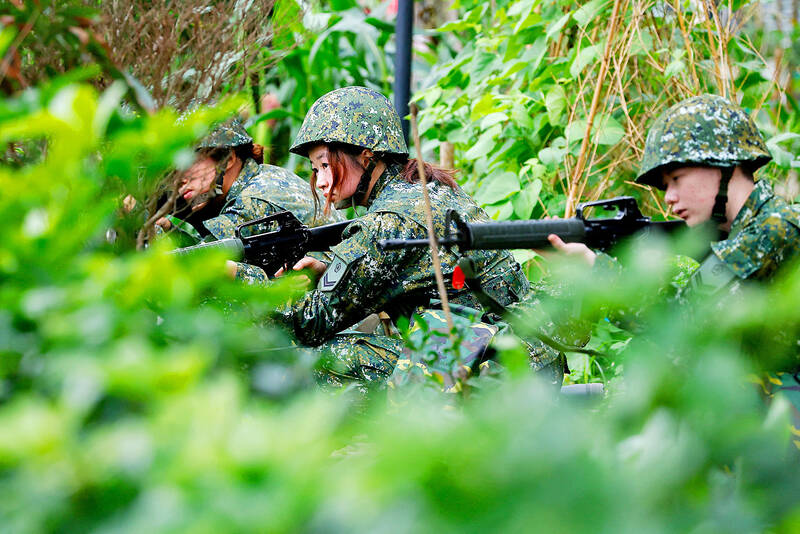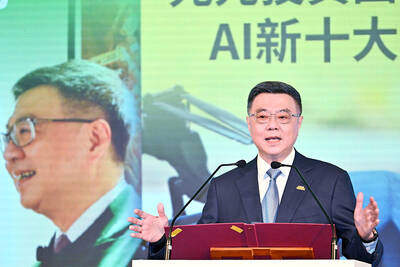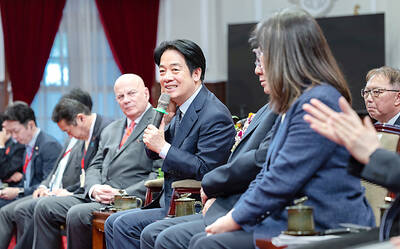While a total of 120,000 reservists are expected to be called up for alternative reserve drills this year, compared with the 6,505 drilled last year, the number has been revised to 58,000 due to a postponed training date, Deputy Minster of the Interior Ma Shih-yuan (馬士元) said.
In principle, the ministry still aims to call up 120,000 reservists for alternative reserve drills next year, he said, but the actual number would not be decided later until after this year’s evaluation.
The increase follows a Legislative Yuan request that the Ministry of the Interior address low recruitment rates, which it made while reviewing annual budgets for the current fiscal year.

Photo: Ann Wang, Reuters
In 2021, 1,565, or 0.86 percent, of the 181,904 male reservists who had retired from military service within the previous eight years were called up for training.
That figure rose to 2,958 the following year and 6,505 last year, a recent report from the department showed.
Following the legislature’s proposal earlier this year, the number of reservists to be called up for training is to soar to 120,000, according to the ministry's latest report to the legislature.
To facilitate the increase, the ministry said it would consider amending the Measures for Recruitment of Retired Male Reservists (替代役役男服役期滿後召集服勤實施辦法) to address issues such as the length and frequency of reservist training sessions.
The regulations define penalties for those who fail to show up for training without reason, and the amendments would seek to balance the rights and obligations of male reservists based on those penalties, it said.
Institute for National Defense and Security Research fellow Su Tzu-yun (蘇紫雲) yesterday said that civil defense would be an important component of Taiwan’s overall defense strategy.
During wartime, reservists could serve critical roles in many areas of civil defense, including firefighting, policing and information technology, Su said.
For example, as Taiwan Semiconductor Manufacturing Co (台積電) and the Chungshan Institute of Science and Technology are strategically important, reservists could help the institutions meet their labor needs during wartime, he said.
“Those called up for training could be proficient in different specialties. By training them in crisis awareness, we can strengthen civil defense and the resilience of society as a whole,” he said.
Kuma Academy chief executive officer Ho Cheng-hui (何澄輝) echoed Su’s sentiments, adding that Taiwan needs a sound civil defense system.
“Taiwan contends with numerous natural disasters, as well as military threats from China. If a serious situation occurs, local governments might not be able to deal with it,” Ho said. “By expanding the number of people called into alternative service, a sound civil defense system can be established to address such emergencies.”
As China would seek to infiltrate Taiwan during a war, civil defense measures should also include training on how to recognize and combat espionage and collaboration with China, he said.
This article has been updated since it was first posted.

Two US House of Representatives committees yesterday condemned China’s attempt to orchestrate a crash involving Vice President Hsiao Bi-khim’s (蕭美琴) car when she visited the Czech Republic last year as vice president-elect. Czech local media in March last year reported that a Chinese diplomat had run a red light while following Hsiao’s car from the airport, and Czech intelligence last week told local media that Chinese diplomats and agents had also planned to stage a demonstrative car collision. Hsiao on Saturday shared a Reuters news report on the incident through her account on social media platform X and wrote: “I

STILL ON THE TABLE: The government is not precluding advanced nuclear power generation if it is proven safer and the nuclear waste issue is solved, the premier said Taiwan is willing to be in step with the world by considering new methods of nuclear energy generation and to discuss alternative approaches to provide more stable power generation and help support industries, Premier Cho Jung-tai (卓榮泰) said yesterday. The government would continue to develop diverse and green energy solutions, which include considering advances in nuclear energy generation, he added. Cho’s remarks echoed President William Lai’s (賴清德) comments in an interview last month, saying the government is not precluding “advanced and newer nuclear power generation” if it is proven to be safer and the issue of nuclear waste is resolved. Lai’s comment had

‘BUILDING PARTNERSHIPS’: The US military’s aim is to continue to make any potential Chinese invasion more difficult than it already is, US General Ronald Clark said The likelihood of China invading Taiwan without contest is “very, very small” because the Taiwan Strait is under constant surveillance by multiple countries, a US general has said. General Ronald Clark, commanding officer of US Army Pacific (USARPAC), the US Army’s largest service component command, made the remarks during a dialogue hosted on Friday by Washington-based think tank the Center for Strategic and International Studies. Asked by the event host what the Chinese military has learned from its US counterpart over the years, Clark said that the first lesson is that the skill and will of US service members are “unmatched.” The second

STANDING TOGETHER: Amid China’s increasingly aggressive activities, nations must join forces in detecting and dealing with incursions, a Taiwanese official said Two senior Philippine officials and one former official yesterday attended the Taiwan International Ocean Forum in Taipei, the first high-level visit since the Philippines in April lifted a ban on such travel to Taiwan. The Ocean Affairs Council hosted the two-day event at the National Taiwan University Hospital International Convention Center. Philippine Navy spokesman Rear Admiral Roy Vincent Trinidad, Coast Guard spokesman Grand Commodore Jay Tarriela and former Philippine Presidential Communications Office assistant secretary Michel del Rosario participated in the forum. More than 100 officials, experts and entrepreneurs from 15 nations participated in the forum, which included discussions on countering China’s hybrid warfare